A lifeline in the heart of the camp: nurse Fawziya Ismail Al-Hasan
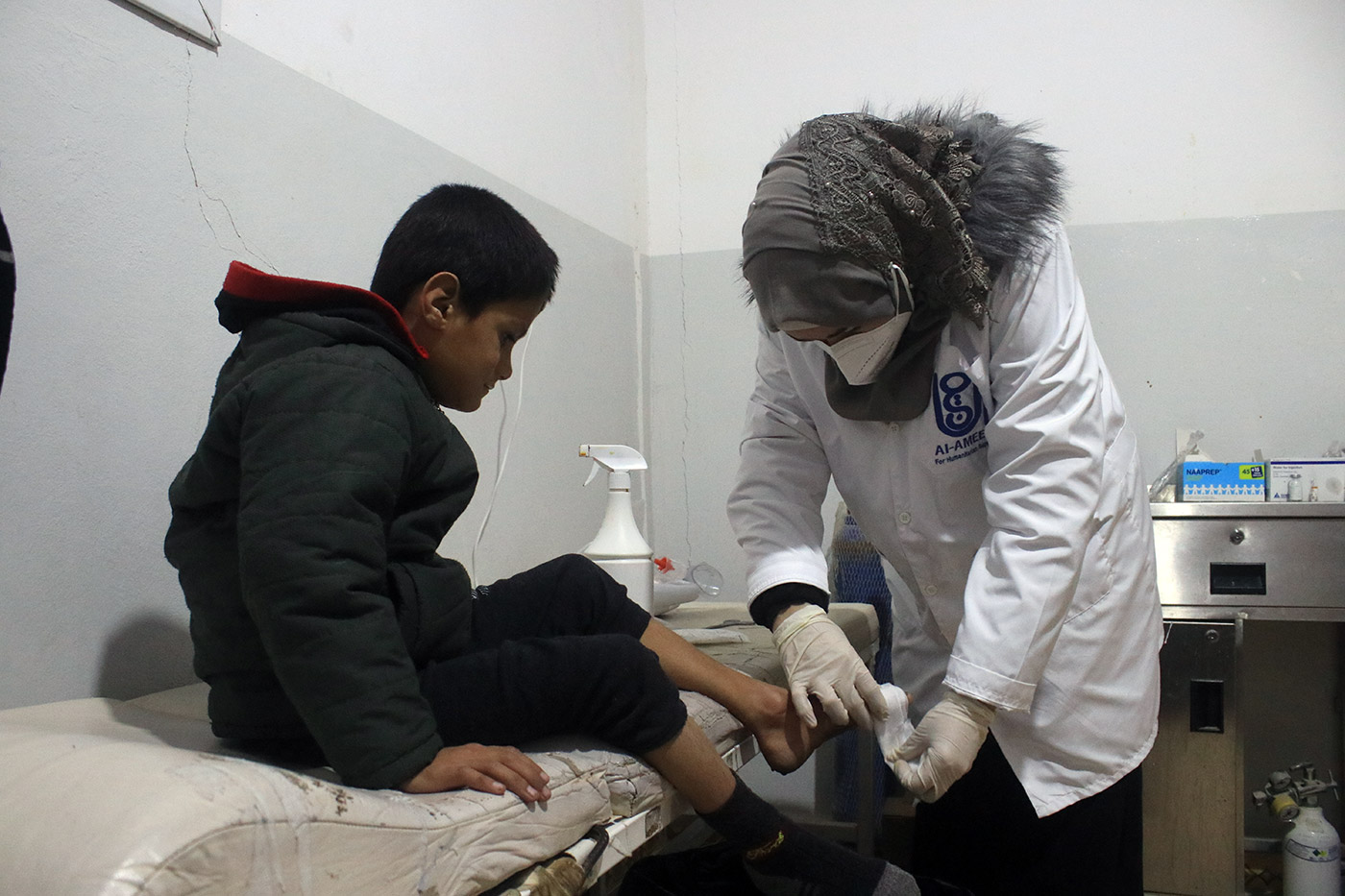 Nurse Fawziya carefully changes a child’s dressing, ensuring proper wound care and recovery. Photo: WHO27 February 2025, Aleppo Syrian Arab Republic – For Fawziya Ismail Al-Hasan, nursing is more than a profession; it is a commitment to serving those who need care the most. Displaced from rural Homs, she has lived with her husband and three children in Qara Kobri camp in Aleppo for over six years. For the past five years, she has worked at the Qara Kobri primary health care center, a facility managed by Al-Ameen, where she joined as a nurse in 2021.
Nurse Fawziya carefully changes a child’s dressing, ensuring proper wound care and recovery. Photo: WHO27 February 2025, Aleppo Syrian Arab Republic – For Fawziya Ismail Al-Hasan, nursing is more than a profession; it is a commitment to serving those who need care the most. Displaced from rural Homs, she has lived with her husband and three children in Qara Kobri camp in Aleppo for over six years. For the past five years, she has worked at the Qara Kobri primary health care center, a facility managed by Al-Ameen, where she joined as a nurse in 2021.
“I provide nursing care for both displaced people and residents in the village and nearby communities,” she explains.
“Since there are no other health centres around, we offer vital services like dressing wounds, disinfecting and stitching injuries, administering IV and intramuscular injections and other essential nursing support.”
A health system under strain
Fawziya’s work is a lifeline for many in the camp and surrounding areas, where health care remains difficult to access. In 2025, 15.8 million people – more than 65% of the total population – will need humanitarian health assistance. Among them are 7.4 million internally displaced persons (IDPs), 22% of whom live in Aleppo. Many, like Fawziya’s neighbours, live in tents with little protection from extreme weather, limited access to clean water and poor sanitation.
With no nearby hospitals, the Qara Kobri primary health care centre is often the only option for people in need. Located in Al-Bab in northern Syria, the centre provides free health care services, from prevention and awareness to treatment. Thousands of patients visit each month for consultations, medications from its pharmacy, and referrals for critical cases in partnership with other health providers.
“We know how important this centre is for people living under tough conditions, far from larger hospitals,” Fawziya says. “Sometimes, we are the only hope for people who cannot afford to travel long distances for basic medical care.”
Saving lives against the odds
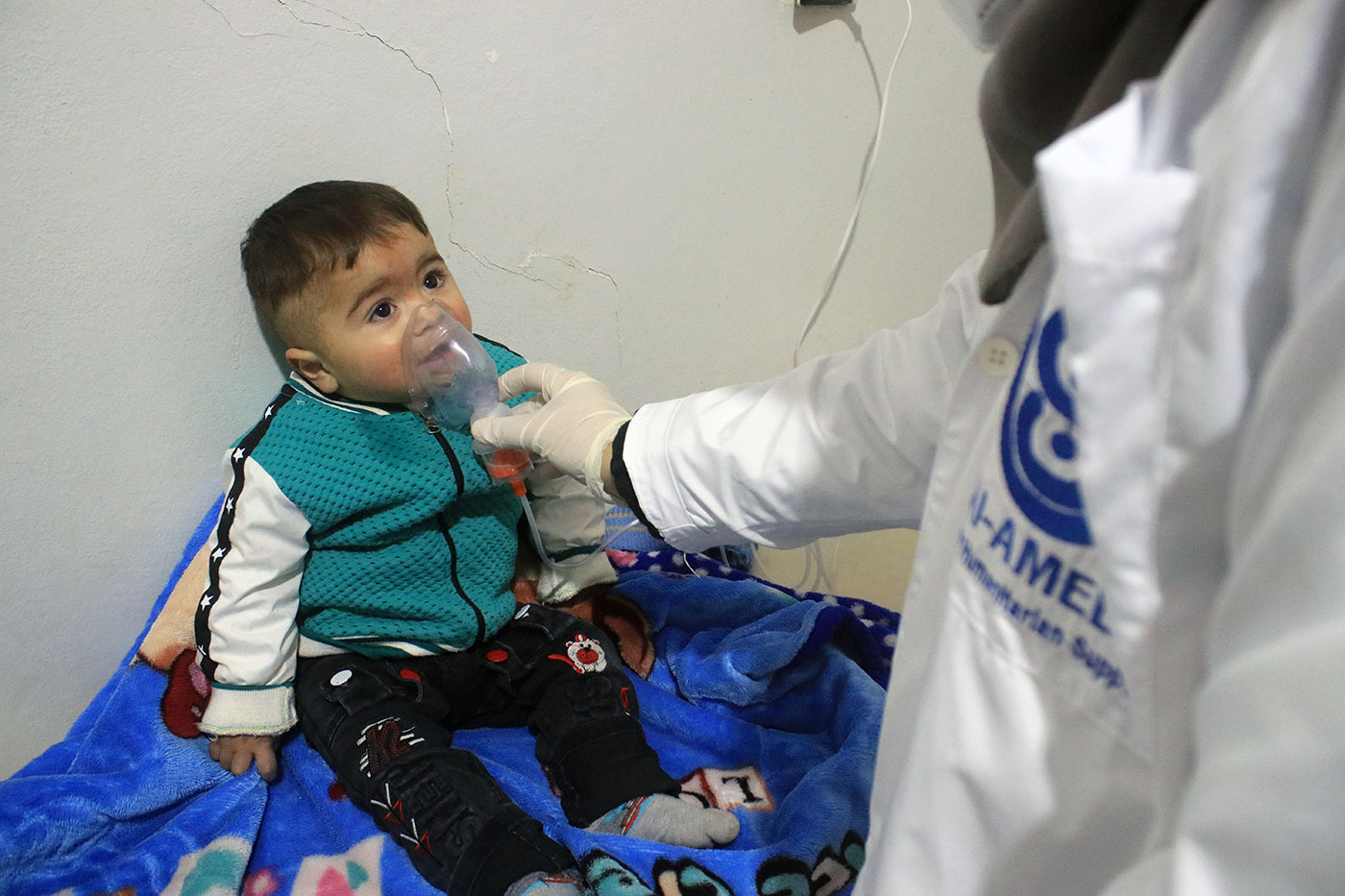 With a rise in influenza cases during winter months, Nurse Fawziya provides oxygen support to a young patient struggling to breathe. Photo: WHOSyria’s health system is in crisis. Across the country, only 57% of hospitals and 37% of primary health care centres are fully functional, with widespread shortages of medicines and equipment. More than 100 health facilities in the northwest lack funding to ensure continuity of services. Those that remain operational struggle with insufficient medical supplies, trained personnel and resources.
With a rise in influenza cases during winter months, Nurse Fawziya provides oxygen support to a young patient struggling to breathe. Photo: WHOSyria’s health system is in crisis. Across the country, only 57% of hospitals and 37% of primary health care centres are fully functional, with widespread shortages of medicines and equipment. More than 100 health facilities in the northwest lack funding to ensure continuity of services. Those that remain operational struggle with insufficient medical supplies, trained personnel and resources.
Despite the challenges, Fawziya is determined. She recalls a young boy suffering from severe dehydration. Without the centre’s quick intervention his condition could have been fatal.
“We face tough situations but standing by our patients, offering not just medical care but emotional support, is what matters most,” she says.
Keeping health care running
WHO, supported by KSrelief, is providing vital assistance across Syria to keep critical health services operational. Over the past 4 months funding from KSrelief has helped sustain more than 50 health facilities in northwest Syria, including hospitals, primary health care centres, dialysis units and tuberculosis treatment centres. Since November 2024, over 154 000 people have benefitted from medical consultations, treatments and surgery.
As well as keeping facilities open, KSrelief support strengthens the referral system and provides essential medicines and medical equipment to ensure patients receive the care they need.
Care and resilience
Despite the hardships, Fawziya finds strength in the team she works with.
“My colleagues are like a second family. We work together with love and dedication, driven by the need to ease people’s suffering.”
She is grateful for the support that keeps the facility running. “Thanks to KSrelief funding our health facility can cover staff salaries, which is vital. Without this support many of us would have to work as volunteers because resources are so limited. KSrelief’s help ensures we can continue to serve our community consistently and with the care they deserve.”
Through partnerships like WHO and KSrelief, facilities such as Qara Kobri primary health care centre remain open, offering a vital lifeline to people in need, today and in the years to come.
Caring for mothers and newborns: Wafaa Al-Doush’s commitment to maternal health
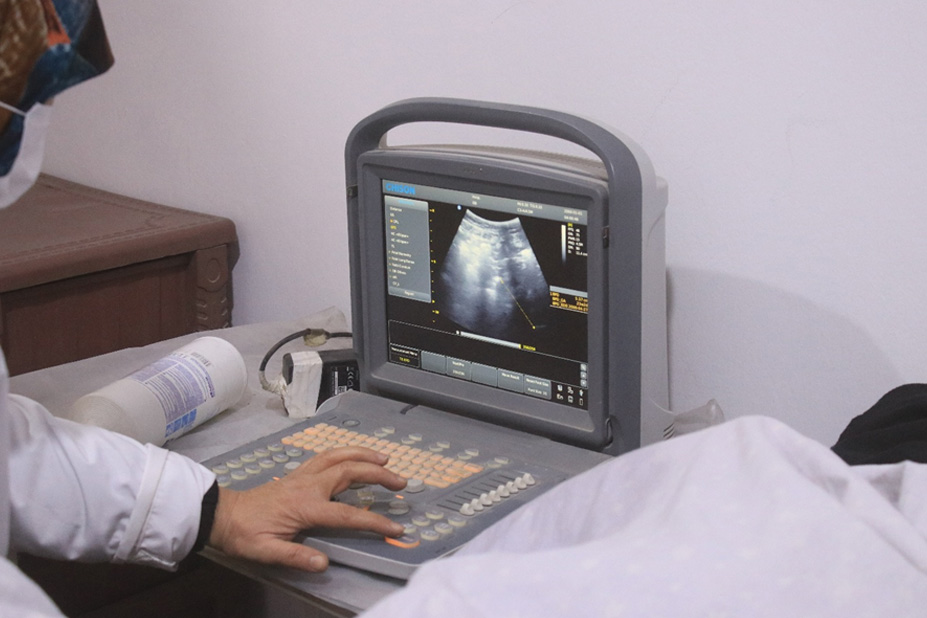 Wafaa Al-Doush performs a routine ultrasound, checking on the health of an expecting mother and her baby. Photo: WHO26 February 2025, Aleppo, Syrian Arab Republic – Wafaa Al-oush has no doubts about what her role as a midwife entails – it is a mission to ensure every mother and baby receive the care they need. Living in Al-Bab, in northern Aleppo, with her husband and young child, she has worked at Al-Ameen Medical Centre for the past 4 years, providing essential maternal health services.
Wafaa Al-Doush performs a routine ultrasound, checking on the health of an expecting mother and her baby. Photo: WHO26 February 2025, Aleppo, Syrian Arab Republic – Wafaa Al-oush has no doubts about what her role as a midwife entails – it is a mission to ensure every mother and baby receive the care they need. Living in Al-Bab, in northern Aleppo, with her husband and young child, she has worked at Al-Ameen Medical Centre for the past 4 years, providing essential maternal health services.
“Every day women come to us full of worries, not just about their pregnancy but about how they will afford food, shelter and medical care for their babies,” says Wafaa. “Sometimes they just need someone to listen, to reassure them that they are not alone.”
A lifeline for maternal health
In northwest Syria, where accessing maternal health care can be a major challenge, Wafaa’s role is critical. In 2025, 15.8 million people will need humanitarian health assistance across the country, many of them women and children. Syria, where years of conflict and natural disasters have made accessing health care even more difficult, is also home to 7.4 million internally displaced people.
“Many women here face challenges getting prenatal care because of the distance to health centres and the costs involved,” explains Wafaa. “Our clinic is often the only option for these women to receive safe and timely care.”
The Al-Ameen Medical Centre serves as a vital health care hub, offering free services to thousands of women in need. Expectant mothers receive prenatal checkups, family planning support and essential maternal health guidance to help ensure safer pregnancies and deliveries.
One of Wafaa’s patients, Rana, a mother of 2, was hesitant to seek care for her third pregnancy.
“I kept delaying my visits because I was afraid of the cost,” she says. “I didn’t realize how much I needed help until I started feeling weak and dizzy all the time. The midwives here didn’t just treat me, they made me feel safe.”
Saving lives against the odds
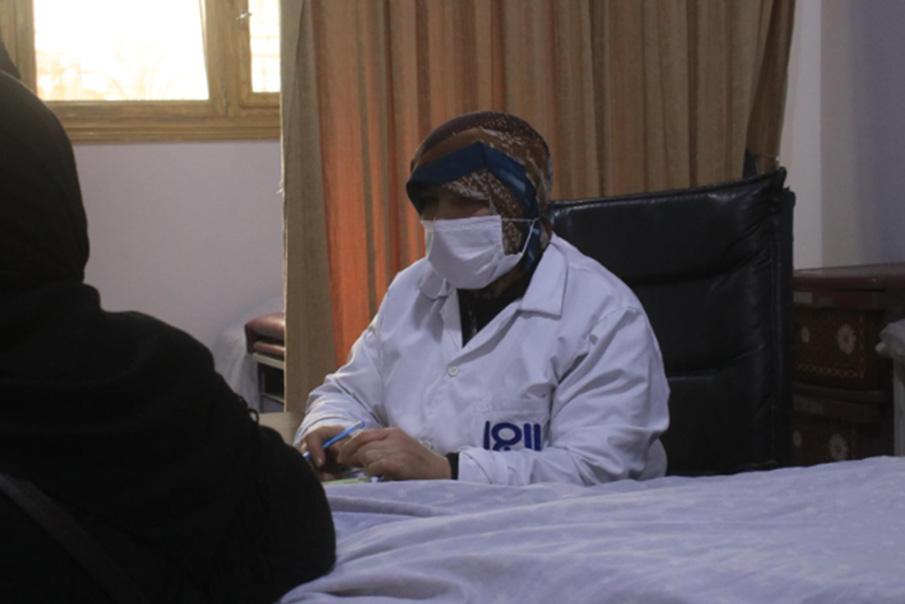 Wafaa Al-Doush reassures her patient with care and compassion. Photo: WHODespite the rewarding nature of her work, Wafaa faces daily challenges. Too often women arrive late in their pregnancies, unaware of complications that could have been managed with earlier care.
Wafaa Al-Doush reassures her patient with care and compassion. Photo: WHODespite the rewarding nature of her work, Wafaa faces daily challenges. Too often women arrive late in their pregnancies, unaware of complications that could have been managed with earlier care.
“I remember one case where a mother arrived in critical condition due to untreated preeclampsia,” she recalls. “She had been feeling unwell for weeks but didn’t come in because she didn’t have the money for transportation. Immediate intervention saved both her and her baby’s life.”
In northwest Syria, over 30 health facilities – including major hospitals – were damaged or destroyed in front-line areas of Idlib and western Aleppo, leaving communities without essential care. The destruction of these facilities has put enormous pressure on the few that remain functional.
“There are entire areas where hospitals no longer exist,” say Wafaa. “Women in labour have to travel for hours to find a place to deliver safely. Some don’t make it in time.”
In northwest Syria, over 100 health facilities are at risk of closure. Across the country, just 57% of hospitals and 37% of primary health care centres remain fully functional. The need for support has never been greater.
Keeping health care services running
KSrelief is supporting more than 50 health facilities across northwest Syria, ensuring that critical medical care remains available. This assistance helps hospitals, clinics and maternity centres stay open and deliver lifesaving services to communities affected by conflict, displacement and the 2023 earthquake.
By funding staff salaries, providing essential medicines, medical equipment and strengthening referral systems, KSrelief’s support ensures that mothers and newborns receive the care they need, at no cost. Since November 2024, over 154 000 people in northwest Syria have benefitted from consultations, treatments and surgeries.
A future in which every mother receives care
For Wafaa, the impact of her work keeps her motivated.
“I dream of a future where no mother has to fear giving birth,” she says. “Where hospitals are restored, where clinics have enough supplies, where women can walk into a health centre and know they will be cared for, no matter what.”
Providing lifesaving care: Dr Aziza Al-Naasan’s dedication to her patients
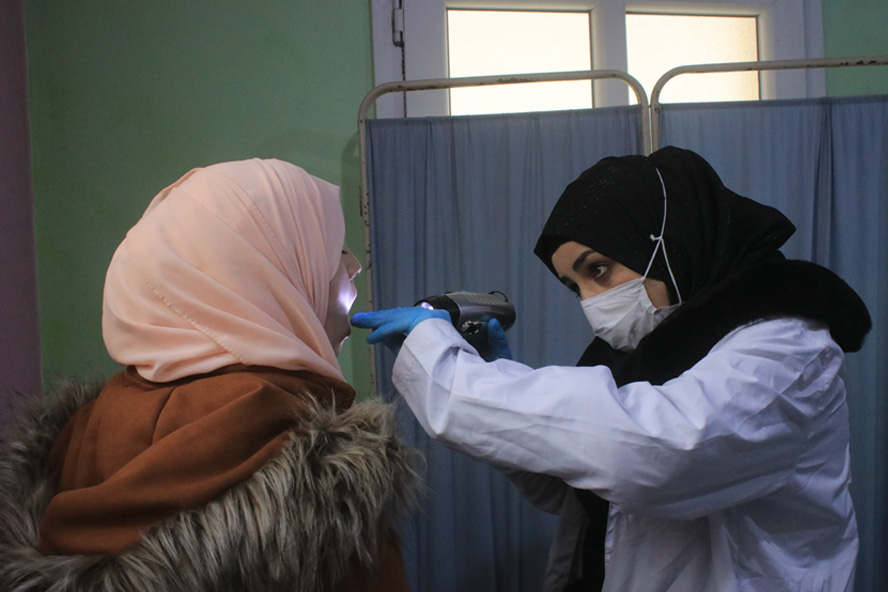 Dr Aziza Al-Naasan attends to a patient. Photo: WHO25 February 2025, Aleppo, Syrian Arab Rebublic – As an internal medicine doctor at Al-Ameen Medical Centre in Al-Bab, northern Aleppo, Dr Aziza Al-Naasan knows that every day is a battle to heal. She treats a steady stream of patients, many suffering from chronic conditions such as asthma, diabetes, heart disease and high blood pressure.
Dr Aziza Al-Naasan attends to a patient. Photo: WHO25 February 2025, Aleppo, Syrian Arab Rebublic – As an internal medicine doctor at Al-Ameen Medical Centre in Al-Bab, northern Aleppo, Dr Aziza Al-Naasan knows that every day is a battle to heal. She treats a steady stream of patients, many suffering from chronic conditions such as asthma, diabetes, heart disease and high blood pressure.
Originally from Idlib, Dr Aziza now lives in Aleppo with her husband and 2 daughters. Like millions across Syria, she witnessed firsthand the devastating toll of conflict on families, communities and the health care system.
“We help patients by providing the right treatment and guiding them on how to take their medication properly,” she says. “We also offer lab tests and diagnose conditions, which greatly improves their health.”
Many of her patients are displaced people who fled their homes due to violence. Syria is home to an estimated 7.4 million internally displaced people, nearly a third of whom live in Idlib and over a fifth in Aleppo. For them, accessible health care is not just about survival today, it is a vital step towards rebuilding their lives.
“We make sure they get the care they need without having to travel far,” says Dr Aziza. “It brings me joy to know that my work helps ease their suffering.”
A health system struggling to cope
Nearly 14 years of conflict severely weakened Syria’s health system. Only 57% of hospitals and 37% of primary health care centres are fully functional and there are widespread shortages of medicines, equipment and trained personnel.
Despite the challenges, hope is emerging. Dr Aziza speaks of a newfound sense of optimism across Syria – a possibility, however fragile, that years of conflict may be nearing an end.
“People have endured unimaginable hardships and what matters now is ensuring they continue to receive health care,” she says. “Even if peace is within reach, rebuilding lives takes time. Without reliable medical care, the suffering will not end.”
She hopes to see her patients – many of whom have lived through profound trauma – return to their homes, rebuild their communities and access health care in stable environments. But without sustained support, facilities like hers struggle to stay open.
Keeping health care running
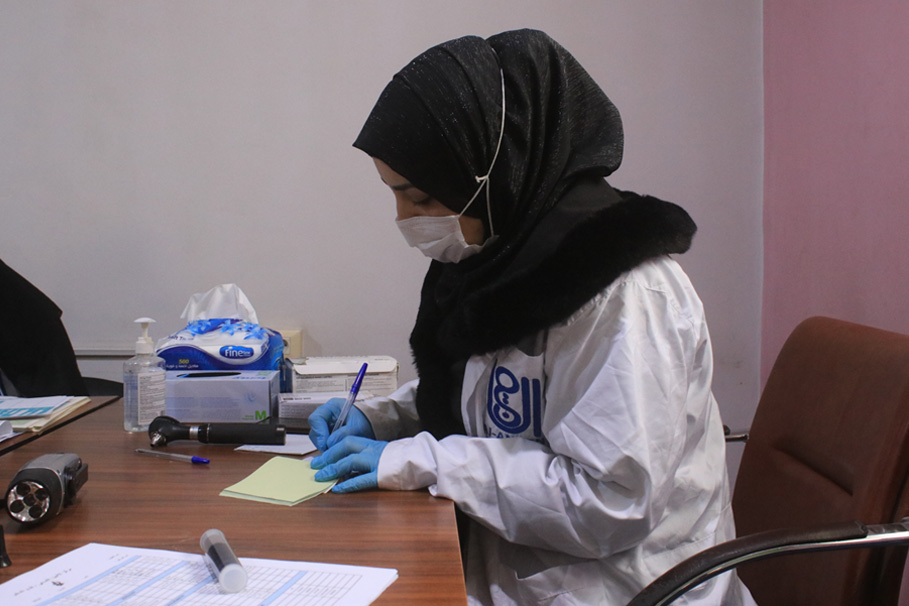 Dr Aziza writes a prescription for her patient, ensuring they receive the care they need. Photo: WHOTo keep critical health services operational, WHO, supported by KSrelief, is providing vital assistance across Syria. Over the past 4 months funding from KSrelief has helped sustain more than 50 health facilities in northwest Syria, including hospitals, primary health care centres, dialysis units and tuberculosis treatment centres.
Dr Aziza writes a prescription for her patient, ensuring they receive the care they need. Photo: WHOTo keep critical health services operational, WHO, supported by KSrelief, is providing vital assistance across Syria. Over the past 4 months funding from KSrelief has helped sustain more than 50 health facilities in northwest Syria, including hospitals, primary health care centres, dialysis units and tuberculosis treatment centres.
KSrelief support has ensured Syrians continue to receive medical care. It has covered staff salaries, preventing health workers from having to serve on a voluntary basis, or worse, see their facilities shut down. It has enabled facilities like Al-Bab National Hospital, Hope Hospital for Pediatrics and Maternity, Al-Bab TB Centre, Mare Dialysis Centre and Jarablus primary health care centre provide lifesaving care. Over 154 000 people have benefitted from medical consultations, treatments and surgeries.
“KSrelief’s support has kept our facility running,” says Dr Aziza. “Without it, many health workers would have no choice but to work unpaid. Consistent funding ensures we can provide quality care – not just in emergencies, but to meet long-term health needs.”
A future built on health and stability
Knowing the road to recovery will be long, Dr Aziza is committed to serving those who need her most.
“We want families to return home knowing they will have the health care they need. Health is not just about treating illness, it is about restoring dignity, stability and hope for the future.”
Thanks to partnerships like that of WHO and KSrelief, Syria’s most vulnerable communities will continue to receive the care they need, today and in the years to come.
Ready to save lives: paramedics upgrade their skills in Syria
 Paramedic Borhan Jasem Kleeb, 33, participates in a practical session during training. Photo: WHO/Mrinalini Santhanam24 February 2025, Aleppo, Syrian Arab Republic – In a busy hospital in Azaz, northern Aleppo, Borhan Jasem Kleeb takes a short break between training sessions to share a story that shaped his life. In 2012, while rushing to the scene of an airstrike in Homs, his ambulance was hit. He hurt his shoulder badly, an injury that still troubles him.
Paramedic Borhan Jasem Kleeb, 33, participates in a practical session during training. Photo: WHO/Mrinalini Santhanam24 February 2025, Aleppo, Syrian Arab Republic – In a busy hospital in Azaz, northern Aleppo, Borhan Jasem Kleeb takes a short break between training sessions to share a story that shaped his life. In 2012, while rushing to the scene of an airstrike in Homs, his ambulance was hit. He hurt his shoulder badly, an injury that still troubles him.
“That day changed everything for me. It made me realize that I wanted to spend my life helping others in emergencies,” says Borhan.
Originally from Homs, Borhan lost his entire family during the 2011–2014 siege of the city. Moving to Azaz, northern Aleppo, gave him a fresh start. Now 33, he works with Syria Relief and Development (SRD).
“I’m married now and have 4 children. They help me see things differently and keep me going,” he says.
One moment during the 2023 earthquake stands out for him. He found a 2-year-old child trapped under rubble, still in his mother's arms. While the mother didn't survive, the child did. “The child turned out to be my friend’s son. While grieving the loss of a close friend's wife, saving the little one brought hope.”
Borhan’s job is challenging on many levels. Last year there were 84 attacks on health care across Syria, of which 77 occurred in November and December. The attacks damaged health facilities and disrupted supplies.
“The airstrikes didn’t spare our ambulances. We often made do with what we had, but health partners worked together to make the most of limited resources, ensuring critical services continued. Even with shortages, we kept ambulances running,” Borhan explains.
 Paramedics during a practical session in the training. Photo: WHO/Mrinalini SanthanamAfter 14 years of conflict, Syria's health system struggles with limited funding for ambulance services and gaps in coordination and referral systems, making it hard for patients to access timely care.
Paramedics during a practical session in the training. Photo: WHO/Mrinalini SanthanamAfter 14 years of conflict, Syria's health system struggles with limited funding for ambulance services and gaps in coordination and referral systems, making it hard for patients to access timely care.
To address these gaps, WHO supports emergency services across the country. Of the more than 200 ambulances in northwest Syria, WHO currently supports 27, and backs the Referral Desk in northern Aleppo, helping streamline patient management and coordination, enabling faster treatment.
Recognizing the need for continuous support for paramedics, WHO has focused on enhancing critical skills such as lifesaving care, managing mass casualty situations and providing trauma care before patients reach hospital. WHO began by training 7 paramedics in northwest Syria who then passed on their knowledge to 80 more paramedics, expanding the impact.
Ahmed Jakmour, a paramedic in his thirties who works with SRD, says the training isn’t just about new techniques but building confidence.
“This training has helped us respond better during emergencies, especially when someone has a heart attack. We've learned how to use defibrillators more effectively and how simple things like the right head position can make a big difference in helping someone breathe,” he says.
Trainers from Medivac Frontline have been central to this effort.
 Trainers conducting a session on neonatal resuscitation. Photo: WHO/Mrinalini Santhanam“Despite the challenges they’ve faced, the paramedics were eager to learn and adapt new knowledge to the Syrian context,” says Fergus Beeley, CEO of Medivac Frontline. “Watching these dedicated paramedics apply their new skills effectively is truly rewarding. Their commitment is to improving emergency care across Syria.”
Trainers conducting a session on neonatal resuscitation. Photo: WHO/Mrinalini Santhanam“Despite the challenges they’ve faced, the paramedics were eager to learn and adapt new knowledge to the Syrian context,” says Fergus Beeley, CEO of Medivac Frontline. “Watching these dedicated paramedics apply their new skills effectively is truly rewarding. Their commitment is to improving emergency care across Syria.”
In 2025, WHO will continue to support Syria’s health system, focusing on essential health services and working with the Ministry of Health. Building on lessons learned in Aleppo and Idlib, WHO also looks to expand emergency preparedness efforts in the northeast, including training paramedics to handle trauma and manage patient referrals during crises.
Borhan is hopeful about the future. “This training is helping us save more lives. We’re learning skills that really matter in emergencies and it means our communities will get better care when they need it most.”








